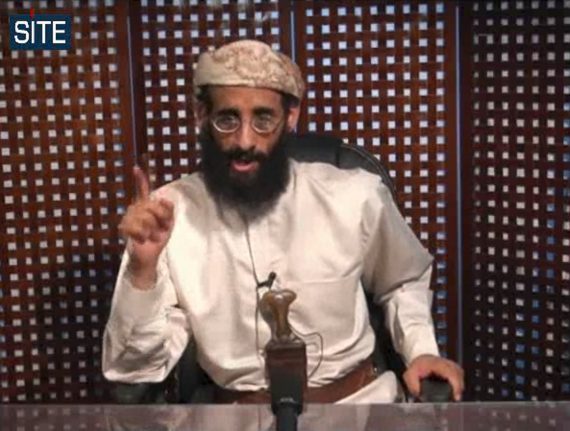There Really Is A Death Panel
We're learning more about the Obama Administration's decision to kill Anwar al-Awlaki
Reuters informs us today that the killing of Anwar al-Awlaki came about on the recommendation of a secret panel of government officials who have apparently been given the authority to determine who the United States can target for killing without due process of law:
American militants like Anwar al-Awlaki are placed on a kill or capture list by a secretive panel of senior government officials, which then informs the president of its decisions, according to officials.
There is no public record of the operations or decisions of the panel, which is a subset of the White House’s National Security Council, several current and former officials said. Neither is there any law establishing its existence or setting out the rules by which it is supposed to operate.
The panel was behind the decision to add Awlaki, a U.S.-born militant preacher with alleged al Qaeda connections, to the target list. He was killed by a CIA drone strike in Yemen late last month.
The role of the president in ordering or ratifying a decision to target a citizen is fuzzy. White House spokesman Tommy Vietor declined to discuss anything about the process.
Current and former officials said that to the best of their knowledge, Awlaki, who the White House said was a key figure in al Qaeda in the Arabian Peninsula, al Qaeda’s Yemen-based affiliate, had been the only American put on a government list targeting people for capture or death due to their alleged involvement with militants
Since this whole thing is cloaked in secrecy, it’s not even clear what role the President, who is supposed to be the man in charge of all of this, actually plays in the process, which leads to the concern that President Obama has essentially delegated authority that he really shouldn’t have the authority to delegate:
The process involves “going through the National Security Council, then it eventually goes to the president, but the National Security Council does the investigation, they have lawyers, they review, they look at the situation, you have input from the military, and also, we make sure that we follow international law,” Ruppersberger said.
Other officials said the role of the president in the process was murkier than what Ruppersberger described.
They said targeting recommendations are drawn up by a committee of mid-level National Security Council and agency officials. Their recommendations are then sent to the panel of NSC “principals,” meaning Cabinet secretaries and intelligence unit chiefs, for approval. The panel of principals could have different memberships when considering different operational issues, they said.
The officials insisted on anonymity to discuss sensitive information.
They confirmed that lawyers, including those in the Justice Department, were consulted before Awlaki’s name was added to the target list.
Two principal legal theories were advanced, an official said: first, that the actions were permitted by Congress when it authorized the use of military forces against militants in the wake of the attacks of September 11, 2001; and they are permitted under international law if a country is defending itself.
Several officials said that when Awlaki became the first American put on the target list, Obama was not required personally to approve the targeting of a person. But one official said Obama would be notified of the principals’ decision. If he objected, the decision would be nullified, the official said.
A former official said one of the reasons for making senior officials principally responsible for nominating Americans for the target list was to “protect” the president
That would be a little concept called deniability. Remove the decision from the President’s purview, and the argument can be made that he can’t be held responsible. If something goes wrong, someone else will be available to fall on their sword. If legal objections are raised, then the President is theoretically protected from liability. It’s a concept that goes as far back as the assassination of Thomas Becket, the Archbishop of Canterbury, in 1170 by courtesans of King Henry II, but not on his direct order. It was the reason for the bizarre structure of the Iran-Contra scheme by Admiral John Poindexter and Col. Oliver North so as to shield President Reagan from direct knowledge of what was being done in his name. And, now, it’s apparently being used to compile lists of people to be targeted for killing without any kind of due process. The phrase Star Chamber comes to mind.
Glenn Greenwald is, not surprisingly, disturbed:
So a panel operating out of the White House — that meets in total secrecy, with no known law or rules governing what it can do or how it operates — is empowered to place American citizens on a list to be killed by the CIA, which (by some process nobody knows) eventually makes its way to the President, who is the final Decider. It is difficult to describe the level of warped authoritarianism necessary to cause someone to lend their support to a twisted Star Chamber like that; I genuinely wonder whether the Good Democrats doing so actually first convince themselves that if this were the Bush White House’s hit list, or if it becomes Rick Perry’s, they would be supportive just the same. Seriously: if you’re willing to endorse having White House functionaries meet in secret — with no known guidelines, no oversight, no transparency — and compile lists of American citizens to be killed by the CIA without due process, what aren’t you willing to support?
That’s pretty much the question I’ve been asking ever since the news of the original kill order against al-Awlaki become public more than a year ago. The revelations regarding the decision making process, as minimal as they are, only heighten those initial concerns. The idea of that a secret panel of government officials can decide on their own who lives and who dies is troublesome on many levels. Additionally, as Greenwald notes, when decisions like this are made in secret and without any kind of legal oversight it’s very easy for the evidence to be manipulated, and even exaggerated:
What’s crucial to keep in mind is that nobody can see this “evidence” which these anonymous government officials are claiming exists. It’s in their exclusive possession. As a result, they’re able to characterize it however they want, to present it in the best possible light to support their pro-assassination position, and to prevent any detection of its flaws. As any lawyer will tell you, anyone can make a case for anything when they’re in exclusive possession of all the relevant evidence and are the only side from whom one is hearing; all evidence becomes less compelling when it’s subjected to adversarial scrutiny. Yet even given all those highly favorable pro-government conditions here, it’s obvious — even these officials admit — that the evidence is “partial,” “patchy,” based on “suspicions” rather than knowledge.
And yet the committee, or whatever, you want to call it, decided that evidence was sufficient to put al-Awlaki on a targeted assassination list. Moreover, although the claim is being made now that he is the only person ever to be put on that list, it was reported back in 2010 that there were at least three or four others on the list with him, none of whom have ever been identified. These are actions that are being done in our name, and they’re being done in secret. That’s not something any American should be comfortable with.
There are some times when secrecy is necessary for the good of the country. The planning for the operation that resulted in the death of Osama bin Laden was secret both because the raid could not have succeeded without it, and because we simply couldn’t trust the Pakistanis with the knowledge of what we were about to do. Throughout that operation, though, President Obama was involved in the decision making and the planning of the operation. There are also times when secrecy is used to hide actions that are improper, immoral, or potentially embarrassing. In the case of the killing of Anwar al-Awlaki, it seems clear to me that punting this decision off to a committee was not only wrong, but the height of irresponsibility on the President’s part. He ought to be ashamed of himself.







This is either a very big deal or no deal at all.
If the committee meets and the president gets the results and says, “Well, okay, the Committee has decided. Let’s go kill the bastard,” we’ve got a Constitutional crisis.
If, on the other hand, this is just an interagency staffing process leading up to a briefing to POTUS which then results in him making a decision, then this is how the national security apparatus is supposed to work since at least the National Security Act of 1947.
My strong guess is that we’re dealing with Option #2.
There was a book by a former Mossad officer back in the 90’s that described the process that had to be done before they could do a hit: The target would be tried In absentia with a judge, defense, prosecution. If found guilty the death warrant would be sent to the prime minister for their signature. The idea being that the PM could never say “I did not know” if things went wrong.
@James Joyner:
Obviously the latter since the former is essentially impossible given that POTUS is Commander in Chief of the military and of course commands the intelligence agencies as well. So as a matter of chain-of-command structure the president makes the decision.
@James Joyner: My strong guess is that giving the President the unfettered, unquestionable, un-appeal-able power of life and death over American citizens is an abomination. Especially since it forces me to agree with [shudder] Glenn Greenwald.
Our failure to check the previous criminal enterprise posing as a presidency led directly to this unfolding of events, dooming all subsequent holders of the office.
It’s not too late. This is a gauntlet thrown at the feet of 50 until now overly timid U.S. AGs who should be checking into hotels all around Vermont and spending time trying to understand why they will arrest W and Dick for war crimes should they come calling.
Vermont. A United State, for f*cks’s sake. One of the original 13.
Seat grand juries TODAY. W’s continued liberty in Dallas makes a mockery of us all. Convert the decimation of their empire of lies into the political will to undo the Patriot Act, among other evils. I do not care who is ensnared. Until America has its Nuremberg, the drain-circling will continue. There must be consequences.
I happen to think the trail will also lead us to the actual people who made off with trillions in 2008.
They got Pinochet ‘ere the end, and Millosevic died in The Hague.
Doug, I really don’t like to nit-pick, but you got a bad word choice that is just too funny not to call out:
It’s a concept that goes as far back as the assassination of Thomas Becket, the Archbishop of Canterbury, in 1170 by courtesans of King Henry II, but not on his direct order.
I think you mean “courtiers.”
But if not, damn, what a way to go..
J.
@James in LA: Man, the crazy is strong in this one.
First up, Vermont was NOT one of the original 13. Take my word from it — I live only a couple of miles from there. Or check it yourself.
Next, I’d ask how the hell you went from “Obama set up a commission to authorize the targeted assassination of American citizens” to full-blown “IT’S BOOOOOOSH’S FAULT!!!!111!!!1!Eleventy!” derangement, but I’m afraid you’d answer.
And why Vermont? Why the Green Mountain State? No, never mind, again I’m afraid you’d answer.
Good god, Obama ran AGAINST all the stuff you’re frothing about, and won decisively. But somehow it’s STILL Bush’s fault that Obama is an astonishingly two-faced hypocrite.
Dude… switch to decaf and lay off the funny mushrooms. Seriously.
J.
@Jay Tea: Point taken on Vermont. It’s still a United State, no more or less than any other where the law is concerned.
I notice to deflect attention, you have to get your anti-Obama talking points in. You fail to realize that once Bush gave the order to torture, this stopped being a political argument, and became a legal problem for the entire country. That means any badge of office or party affiliation is meaningless.
Except it’s not, and it makes Obama just as big as an accomplice as Bush. The trouble is, we don’t like Obama’s targets, even the American citizens, and they make terrible victims. The fact remains: the U.S. Presidency remains utterly unchecked. Pray he doesn’t become disgusted with YOU.
They got Pinochet ‘ere the end, and Millosevic died in the Hague. This cannot end well if we are willing to allow one man decide the fate of all men.
@junyo: I’ve written about this at great length previously but suffice it to say that there are plenty of procedures in place to prevent this. Absent exigent circumstances, where the citizen was both an active enemy combatant and nearly impossible to arrest,
1. The military and intelligence agencies would flat out refuse the order.
2. Congress would impeach the president in a heartbeat.
@James in LA: Putting aside your Bush Derangement, let’s talk about the actual issue.
There’s a saying that “tough cases make for bad laws.” Likewise, Al-Awlaki makes for bad policy.
The guy absolutely needed to come down with a bad case of the blowed-ups. I’m delighted he’s now mulch.
But using the arguments of Obama and his supporters as when applied under Bush, it is an absolute atrocity. Getting technical for a moment, this guy was an American citizen who was never formally charged with a single crime — and the President of the United States, aided and abetted by a Star Chamber, ordered him killed. No due process, no trial, not even a formal indictment. And it’s unclear just what crimes he committed — the free speech militants would argue that since it was only words, he was innocent of actual crimes.
As I said, I got no problem with him being blown up. But it’s one huge, scary precedent. Next time, will it be limited to an American who’s been abroad for years, and a leader of a confirmed enemy of the United States? Should Eric Cantor and Andrew Breitbart start looking over their shoulders for drones?
That it’s Obama doing it — a president I’m not inclined to trust anyway — makes it slightly worse for me, but I wouldn’t trust any president with this kind of power.
J.
@Jay Tea: Jay, if you were president, how would you have handled the situation differently? I’m curious because you do seem to acknowledge that Al-Awlaki was a deserving candidate for a drone strike, but you don’t trust Obama to do it. Would you trust yourself?
(I know I wouldn’t trust myself. )
No it’s not. The president was never intended to have or given the ability to order assassinations of american citizens with no oversight what so ever. Irregardless of whether the order originates with a secret panel or with Obama himself it is grossly illegal.
This is where we end up after we let the government believe that it can flout civil rights with impunity- wiretapping becomes torture, and torture becomes nothing less than murder.
Except they’d never know. You seem to keep ignoring that part of the issue.
@Herb: That’s what I meant, Herb. Tough cases make for bad examples.
I’m not proud to say this, but I think the best solution was the old “plausible deniability” thing. “Oops, something bad happened to this guy.” When Obama made the whole thing public, that was when it it all got very, very messy.
The problem is, Obama ran as an idealist. Now he’s been mugged by ugly reality. The problem is, he doesn’t even attempt to reconcile the two — he just does what he ran against and pretends there’s no contradiction.
J.
Any governmental process — secret or otherwise — which results in the likes al-Awlaki assuming room temperature is the very essence of good government.
As for Rambobama being out of the loop, well, let’s not be naive: as far back as mid-2009 the adults in the room kicked Rambobama out of the loop concerning the War on Terror. This is a good thing. It’s simply too important. You can’t have an affirmative action case with less real world experience than a babysitter involved in actions that directly affect the fundamental safety and security of a sovereign nation at war.
Lastly, when you’re fighting an asymmetrical global war against fanatics who don’t play by the rules of war there’s neither the time nor the ability to be hampered by legal niceties. You have to take the gloves off. Granted, the academe will be distressed. Various fringe demographics will be distressed. Ultimately that is of no consequence. The means are justified by the ends.
@James Joyner: There ARE procedures to prevents this. They’re called “courts”.
I’ve read you writing on the subject and have consistently been baffled as to why/how an apparently intelligent person such as yourself seems to be oblivious to the danger here. Even in the clear light of day, with competent adversarial advocacy people get wrongly convicted. But it’s okay to have the government putting hits out on citizens (with ZERO accountability or means to appeal) because, trust us, some military officer will throw himself in front of a guy his boss is saying is a terrorist. Or Congress will.
For the record, all the impeachment in the world won’t do a eff’n thing for the dead guy. And I’d like to see one piece of objective evidence that shows that Al-Awlaki was an “active enemy combatant”, because near everything I’ve read has him as an organizer and recruiter.
This is a blazingly bright line, that a government can’t cross and maintain legitimacy. You can’t deprive the people you are sworn to protect and defend of their most basic right without a massive amount of circumspection. And the cavalier nonchalance of it all, and the meekness with which people swallow being told that they are a name on a list away from having their government having them murdered, is what makes it even more contemptible.
@Jay Tea: Absolutely the point. I’m not really all that broken up because Al-Awlaki’s dead. The problem is cats and their stance on being put back into bags.
Would I trust myself with this power? Sure, but I’m a heck of a guy. But invariably someone who’s not a heck of a guy winds up as President, and once you’ve established that the president can kill people, you can’t really tell that president he can’t have a chance to kill some people too. Folks forget when they make these rules that sooner or later someone they didn’t like would get to use them. Clinton got extra powers after the first WTC bombing, which were strengthened into the Patriot Act, which BHO hated until he was in the Big Chair, at which point he suddenly found that he was in favor of turning the volume up to 11. And that ostensibly “anti-terror” power has been deployed against such clear and present terror dangers as drug dealers, copyright pirates and homeless people.
But it’s okay, because they really only intend to you this bit of extra power on really bad guys. Honest Injun, pinkie swear.
How about that Pan Am bomber / mass murderer? Released from prison and now sitting in the lap of luxury? Who is paying for all of his “medical” care? A drone would give him the real care he needs and justice would finally occur.
@Catfish: Not an American citizen, so it’s a bit of a lesser standard.
J.